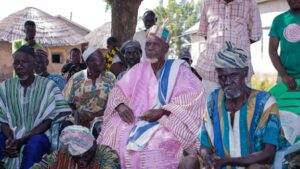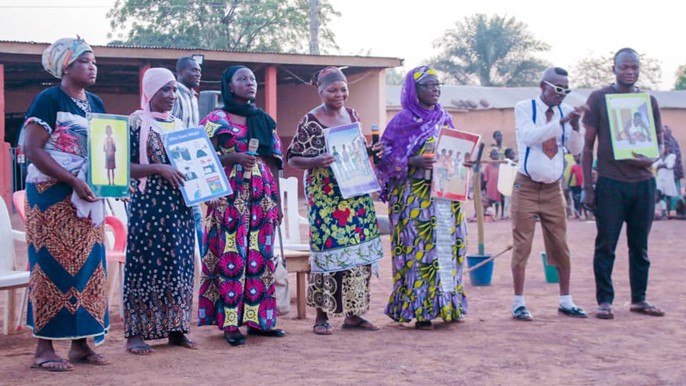Promoting the rights and well-being of children has been the hallmark and commitment of the United Nations International Children Education Fund (UNICEF) in achieving the Sustainable Development Goals (SDG 1,2,3,4,5,13 and 16) for 190 countries.
The promotion of child’s right is the best way in ensuring children have access to quality education as a minimum to become good thinkers and better citizens.
According to the goals, every child has the right to survive and thrive for a better future and therefore, needs to be protected against poverty, hunger, poor health, gender inequality, climate change and violence against children by 2023.
This has encouraged UNICEF to show commitment in embarking on advocacy programmes to improve the life of every child through the United Nations Special session on children to encourage young children to speak out and participate in decision-making that affects their lives.
In view of that, the ‘Ghanaians Against Child Abuse (GACA)’ drama programme – in collaboration with UNICEF, the Centre for National Culture (CNC) in Northern Region, Northern Region and other selected centres like the Department of Community Development, Social Welfare, Department of Child Protection, Environmental Protection and Health Agencies – titled ‘For our Bright Future, End Child Marriage, Now!’ has been held in some selected communities in Tamale.
The programme was developed using drama as a tool to effect social and behavioural change in communities in order to protect Ghanaian children, as mandated by the Child and Family Welfare Policy developed by the Ministry of Gender, Children and Social Protection.
It was also intended to prevent abuse of children in various forms, with support from parents, guardians, teachers, children, government institutions and the project communities.
The script, produced by Antoinette Dzorgbenyuie Letsa – a focal person at CNC, Northern Regional office, was also aimed at contributing to national development of the younger generation.
The performances took place at Tolon (Wantugu, Yoggu, Kpendua, Cheshagu and Nyankpala), Kpandai District (Kabonwule, Nkanchina No. 2, Katiejeli, Buya and Kokonagyi) while in Tatale at Nkanligbani, Bekpajeb, Kandin, Sheini and Sanguli.

At the communities, drama and cultural groups were engaged to rehearse and perform with prepared scripts to help educate and entertain the audiences. The performances were in dialects of the various project communities – Dagbanli used in the Tolon communities, Konkomba in Tatale communities and Twi in Kpandai communities.
The key areas covered by the drama script included physical, emotional, psychological and sexual abuses. There was also menstrual and personal hygiene, good sanitation, neglect, child labour, ending child marriage and corporal punishment, inclusive education for both male and female children, birth registration and acquisition of birth certificates for children at birth.
Sanitation, hand hygiene with the use of the tippy tap and personal hygiene with lime were advocated; and they have started practising the expected behaviour. Some people didn’t know that lime could reduce or prevent body odour until they watched the drama. They also indicated that they now know the dangers in child marriage and where to report all forms of abuse.
In addition, the community members were excited to understand that a girl could go to school if pregnant or after delivery in order to, one day, become experts in the works seemingly reserved for boys or men.
Though community members didn’t know that child marriage was illegal, the play informed them appropriately and they currently also know that a girl can still go back to school even after pregnancy, but it’s not to encourage girls to get pregnant. Hence, girls should not be given in marriage in exchange for gifts and parents should provide children with their basic needs to prevent attracting them to boys.
Furthermore, solutions proposed indicated that parents should encourage children to wash their hands with soap under running water, especially before eating and after visiting the toilet. They also proposed that women with babies should be washing their hands with soap before selling food to the public. Initially some people thought that a child’s excreta was not harmful, but the discussions on the dramas have taught them that every excreta is harmful.

Additionally, solutions included the fact that young people should avoid sex because most of the underage girls who get pregnant go through Caesarian sections, which indicates that getting pregnant at a tender age is not the best. They should learn a trade or be in school.
Similarly, young girls who bring boys for marriage themselves have to stop and concentrate on their education to achieve their potential. With personal hygiene, it was said that parents should provide lime and soap for the family to help both the young and the adults from having body odour.
Also, it was mentioned that pregnant girls should not be sent to the boys’ houses to become their responsibilities; but should stay with their own parents for proper care so they can return to school, else the children will suffer. It was further highlighted that the message of abstinence from sex should not be for only girls, but also for boys.
Community members and opinion leaders acknowledged the effort of UNICEF and CNC in using drama to promote child rights in the areas.
According to them, the dramas brought to light many issues of concern – particularly child marriage, teenage pregnancy, sanitation, education and hygiene behaviours – that have been affecting the societies.
It has been educational, entertaining and informative, especially when our community members were used to performing the drama, they said.
As a result of the dramas from the communities with the use of relevant flashcards to steer dissuasions, the community members now know where to report cases of child marriage or any form of abuse, according to Mad Letsa.
They know the importance of girls being in school and having skills training; hence, some girls are given the opportunity to go back to school after staying home for months, she said.
They as well realised that cleanliness protects one against diseases as the use of insecticide treated nets prevent malaria, she added.
Beautifully framed pledge certificates were presented to the chiefs as well as a pledge banner signed by opinion leaders and community members to end all forms of child abuse, particularly child marriage, she said.
She noted that in an effort to work together with the community members to change behaviour, proposals for solutions were requested from them during the open forum sessions after the drama performances.
They agreed for children to be restricted with regards to mobile phone use, since they are always on the phone watching unnecessary videos and making calls that will not give them anything beneficial, she added.
She encouraged parents to follow up on their children at school so they can monitor them and their academic work, saying if parents follow up on their children in school to know how they are performing academically and how they behave, discipline will be easier.
The men were encouraged to support at home to be able to care for the family properly because collective-parenting is key for a better future.
Some parents have agreed to acquire birth certificates for their children as soon as possible upon hearing the benefits they have for the children and the family. Men were also admonished by opinion leaders to allow girls to go to school to their highest level before they ask their hands in marriage.
The Director at CNC-N/R, Mr. Abubakari Iddrisu Saeed, said the drama was used to encourage most project community members to come up with educational plans for their children in order to stop them from danger.
At Nyankpala, chiefs agreed that parents whose children were seen out of their homes late at night for entertainment programmes would be invited by the chief and sanctioned with a fine or any punishment the chief deems fit to serve as deterrent.
It was pronounced by the chief that no child should drop out of school and that any child that drops out of school should be reported to the chief to make arrangements to send the child back to school, he said.
Also, at Sheini in the Tatale District, the chief and his opinion leaders committed to take steps to protect their community children against any violence.
Therefore, the tax force committee was set to go to Nigeria to bring back girls who have travelled out of their community to Nigeria for ‘kayaye’, he added.
According to him, the journey was successful; and plans are in place to return this year to bring back more girls to be trained in different fields while others return to school.
“Our appreciation to UNICEF for funding the project, the entire staff of CNC, the three drama groups used for the drama performances in the three districts, stakeholders in all three project districts and Business and Financial Times for their contributions,” he said.
Mr. Mohammed Ofei Wun-nam said opinion and religious leaders have also pledged to end child marriage and other forms of abuse, and promote good hygiene behaviours.










